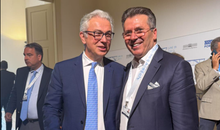
 Flash News
Flash News
"Politico" declares Giorgia Meloni the most powerful leader in Europe

In less than a decade, the leader of the right-wing Brothers of Italy party has gone from being dismissed to being elected prime minister of Italy and establishing herself as a figure with whom Brussels, and now Washington, can do business, writes 'Politico' .
Although she has moved into the center, Meloni - who began her political career as an activist in the youth wing of the neo-fascist Italian Social Movement and praised dictator Benito Mussolini as "a good politician who did everything he did for the good of Italy" - has been at the forefront of a wave that is pulling European politics towards the far right.
Indeed, since her election in 2022, the Italian prime minister has introduced policies on issues like migration and LGBTQ+ rights that would once have drawn condemnation from Brussels. Instead, the reaction from European Union leaders has ranged from indifference to approval, with many accepting Meloni as the pleasant representative of the increasingly radical zeitgeist flourishing on both sides of the Atlantic.
The inability of conventional politicians to counter an increasingly popular ultranationalist narrative and their willingness to collaborate with Meloni on the European stage enable Italy's 47-year-old prime minister - who insists on using the masculine form of her official title, Il Presidente del Consiglio - to be a strongman capable of wielding extraordinary power at a time when the continent lacks powerful centers capable of taking it on.
Meloni made headlines around the world when she became Italy’s first female prime minister, but few predicted she would last long in office. Experts expected internal squabbles to inevitably split her governing coalition of right-wing parties, and there was little appetite for her in Brussels. After years of tolerating the actions of Hungary’s Viktor Orban, key EU figures were not enthusiastic about the arrival of a leader who had campaigned on “God, fatherland and family” and formed a government with parties sympathetic to Russian President Vladimir Putin.
But over the past two years, Meloni has consolidated her government as one of the most stable in post-war Italy. Although the country is burdened with a national debt equal to 137 percent of its gross domestic product, the economic outlook is not so dire as to scare away foreign investors attracted by the remarkably calm political environment.
Meloni's carefully cultivated image contributes to the image of stability. After the president of the Campania region, Vincenzo De Luca, referred to the prime minister as a "stronza" ("whore") at a campaign rally, the prime minister appeared at an event in his region and greeted the opposition politician by saying: "President De Luca, I am that whore, Meloni. How are you?"
Moreover, Meloni has targeted Italian judges who have ruled that some of her government's policies are illegal, posting scenes on social media accusing them of plotting against her. Several jurists have subsequently received death threats and sought police protection. The Council of Europe, a top human rights body, recently warned that "excessive criticism of individual judges puts their independence at risk."
Latest news


Not only the body, swimming also helps the brain
2025-07-05 21:02:49
"Be careful with the water", Alimehmeti warns about the health risks of summer
2025-07-05 20:39:10
PSG beats Bayern Munich 2-0, advances to Club World Cup semifinals
2025-07-05 20:19:38

Two vehicles collide on the Elbasan-Peqin axis, drivers injured
2025-07-05 19:26:29

What does Zelenskyy have more than Zegjineja?
2025-07-05 18:45:26

Fiscal peace, but at a cost
2025-07-05 18:00:10
'Bankers' tax evasion, Chinese CEO and former director jailed
2025-07-05 17:39:21
Kyle Walker joins English club on two-year deal
2025-07-05 17:20:24
Two cars collide on the Saranda-Delvina axis, 4 injured
2025-07-05 17:05:29
Touching gesture! Liverpool will pay Jota's family's salary until 2027
2025-07-05 16:45:18
The zodiac signs that cheat most often
2025-07-05 16:25:53

"I asked for the dismissals", Dredha tries to soften Rama's 'blow' in Vlora
2025-07-05 15:48:49
Bomb threat in Parliament, prosecutor: It was a lie
2025-07-05 15:22:28

Bardhi: The recount revealed how greedy Zeqine Balluku is in stealing
2025-07-05 14:44:29
Knife wound on the secondary road Tirana-Durrës, perpetrator sought
2025-07-05 14:37:54
Tears and pain, Diogo Jota is escorted to his final home
2025-07-05 14:21:34
Success starts with yourself! Simple ways to invest in personal development
2025-07-05 13:58:50
Unlicensed firearms found in apartment, 50-year-old arrested in Lushnje
2025-07-05 13:43:11

Tirana Court remands Skerdi Sina to prison
2025-07-05 12:59:34
Cocaine laboratory in Greece, here are the Albanians arrested and wanted
2025-07-05 12:40:16
Directed Justice/Vangjeli: SPAK does not investigate any scandal involving Rama
2025-07-05 12:22:03

Bomb alert, Police remove MPs and media from Kosovo Parliament building
2025-07-05 11:48:16
"The will of the people" and the irony of ordered resignations
2025-07-05 11:32:05
Summer drowning risk: How to enjoy the water without risking your life
2025-07-05 11:20:27
Fire situation in the country, 16 fires reported in 24 hours, 4 still active
2025-07-05 11:07:04
Car hits pedestrian at white lines, injured in serious condition in Vlora
2025-07-05 10:59:58
Mosquito-borne diseases are a growing problem in Europe
2025-07-05 10:44:13



One of Sweden's most dangerous and wanted criminals arrested in Turkey
2025-07-05 09:38:29
Foreign exchange/ How much foreign currencies are bought and sold today
2025-07-05 09:18:38

"Don't be influenced by the opinions of others", today's horoscope
2025-07-05 08:40:50

Morning Post/ In 2 lines: What mattered yesterday in Albania
2025-07-05 08:02:07

Trump says he's ready to raise tariffs to 70% on some countries
2025-07-04 22:35:52
Tre shenjat e zodiakut që do ‘pasurohen’ në Korrik
2025-07-04 22:05:09
Gaza War: Hamas Accepts US Proposal for 60-Day Ceasefire
2025-07-04 21:50:10
Autocracy in Albania, Fuga: Governance has gotten out of control
2025-07-04 21:40:51
Meta: Agriculture on credit, the new fraud!
2025-07-04 21:26:39




Vote recount in Durrës ends without changes
2025-07-04 20:12:54
Gas station explodes in Rome, 25 injured (VIDEO)
2025-07-04 20:00:20

These afternoon habits often sabotage weight loss
2025-07-04 19:39:28
Former Arsenal player Thomas Partey accused of rape
2025-07-04 19:24:21
Shepherd disappears without a trace in Delvina
2025-07-04 19:14:31

Bardho gave Zegjine's mandate/Braho: Unfair! It violates the electoral system
2025-07-04 19:01:08


Rapid developments in the Sultanates!
2025-07-04 18:00:06



Italy tightens rules for skateboard traffic
2025-07-04 17:20:18

Unusual for the time, dense fog covers the coast of Vlora
2025-07-04 16:48:01


Accident on the Shkodra-Lezhë axis, one dead and 3 injured
2025-07-04 16:14:19
Albania with fewer requests for asylum and Albanian citizenship in 2024
2025-07-04 16:06:57

Albania last for quality of life, DP: Technical government is the solution!
2025-07-04 15:42:30
Nico Williams says "No" to Barcelona, signs with Athletic Club until 2035
2025-07-04 15:33:35
Fires in the country, four fires are still active, what is the situation?
2025-07-04 15:24:20

Summer brings big changes for these 4 zodiac signs
2025-07-04 15:00:04
Osmani: MPs need to agree to a secret ballot for the Speaker of Parliament
2025-07-04 14:51:09
Serious accident on the Peqin-Elbasan axis, two injured
2025-07-04 14:37:56

GJKKO leaves in force the security measure for the head of the KPP
2025-07-04 13:58:17
Who will replace Ilir Meta and take over the leadership of the PL?
2025-07-04 13:50:36
Berisha: Dismissal of directors in Vlora, another act of 'scapegoats'
2025-07-04 13:41:46




Librazhd/ In a serious psychological state, the young man consumes pesticides
2025-07-04 13:05:07


Weapons trafficked from Kosovo to Albania, two arrested, 8 pistols seized
2025-07-04 12:33:28
Konsumimi i tepërt i çokollatës, ja cilat janë dëmet që shkakton në organizëm
2025-07-04 12:23:35

Fires in the country, 21 fires in the last 24 hours, 4 still active
2025-07-04 12:00:19
WB calls for debt transparency: Albania to publish details of every loan
2025-07-04 11:50:05
